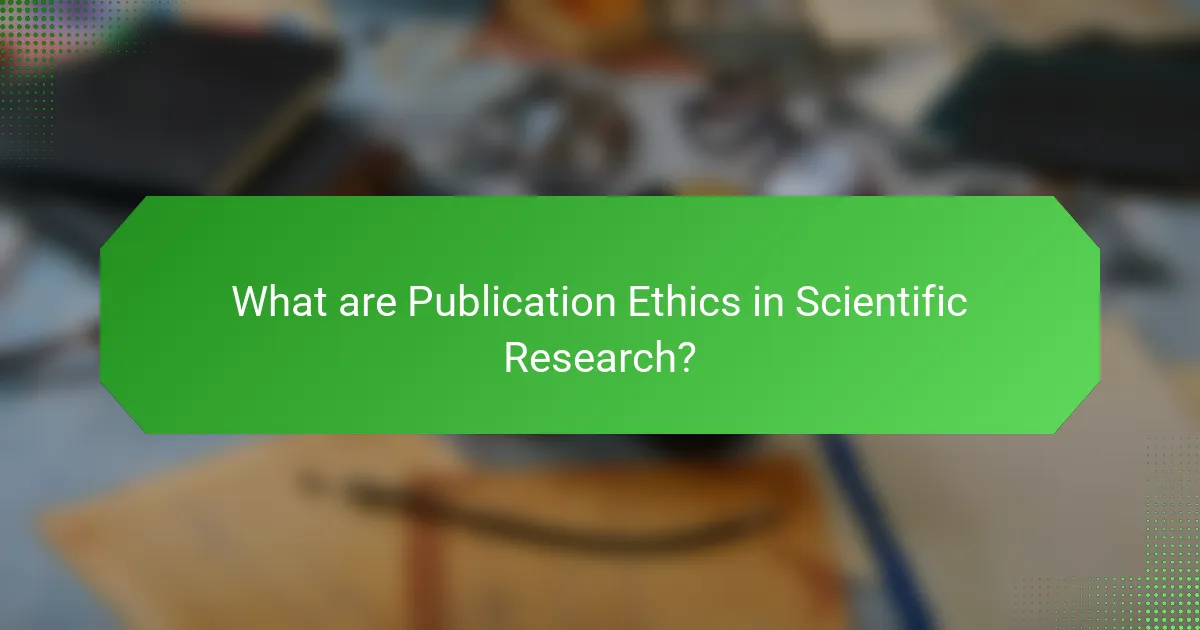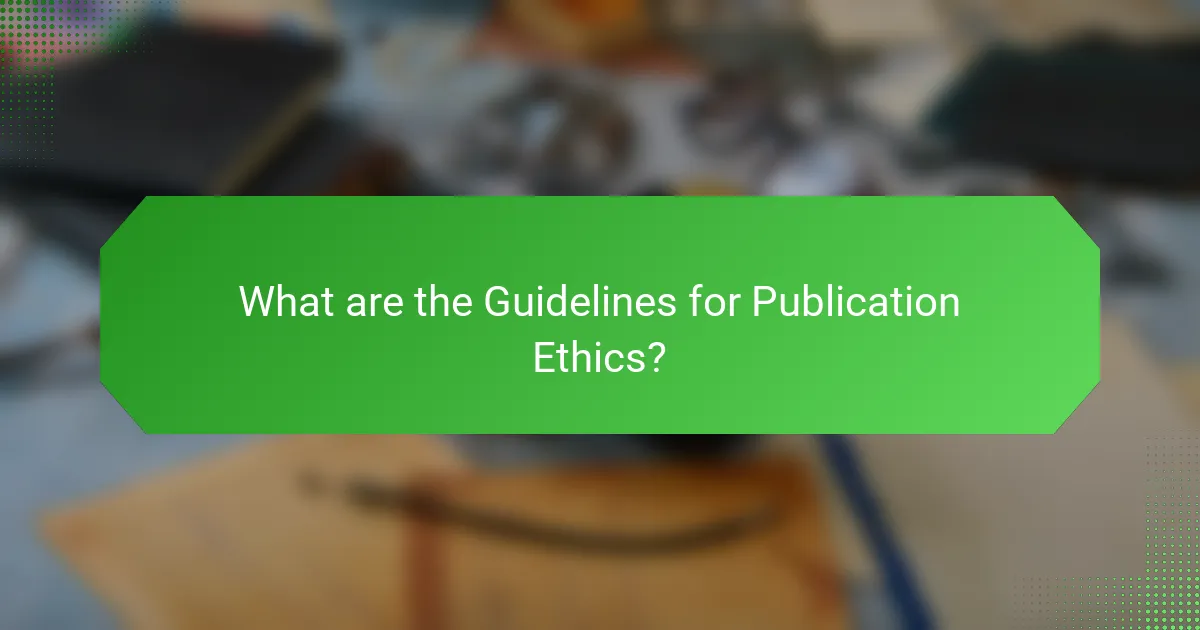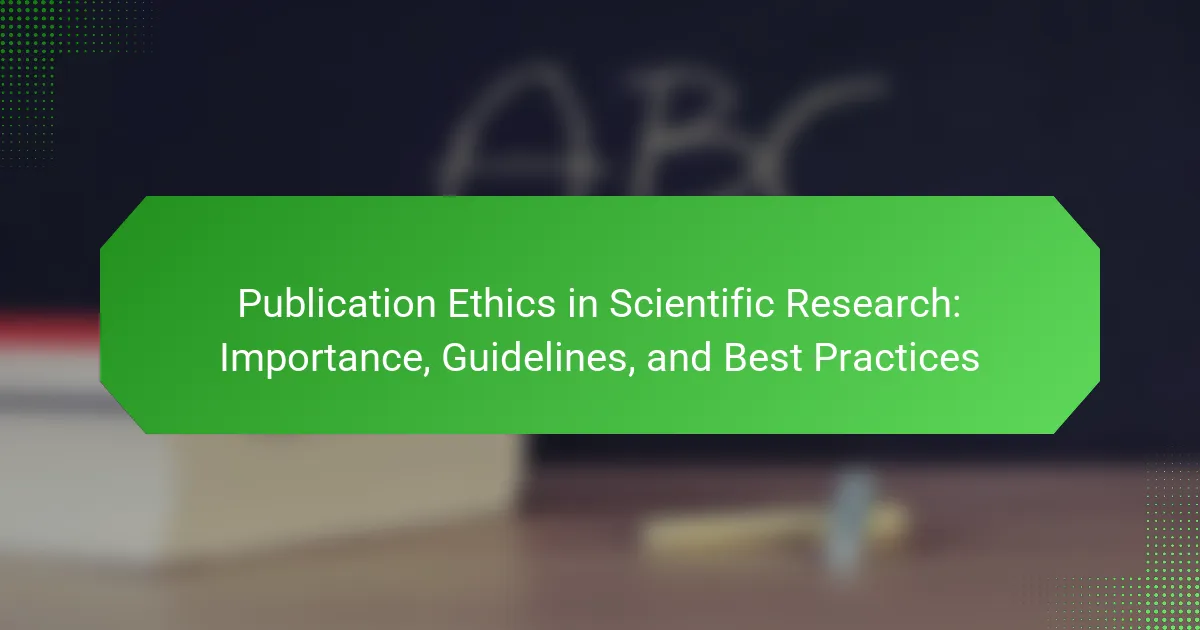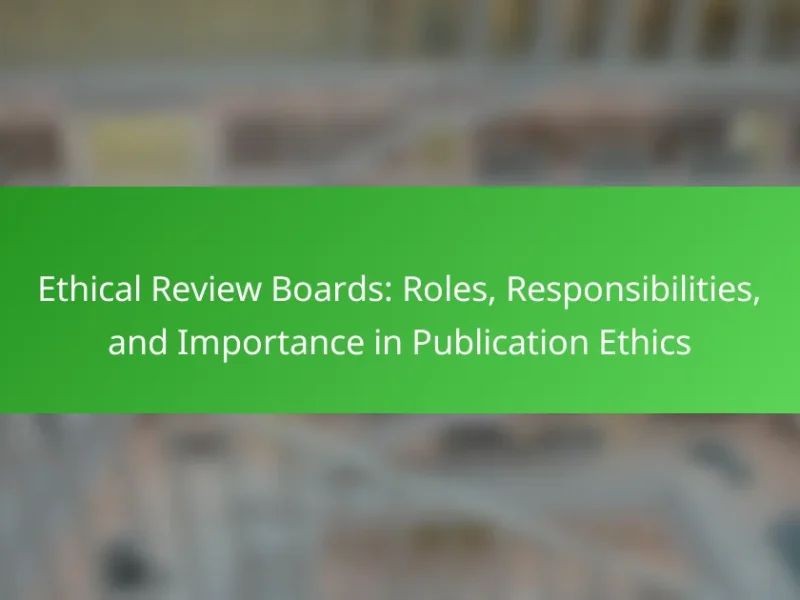Publication ethics in scientific research encompass the principles that guide researchers in sharing their findings with integrity, transparency, and accountability. Key components of these ethics include avoiding plagiarism, ensuring accurate authorship, and disclosing conflicts of interest. The article outlines the importance of adhering to guidelines for data sharing and publication, as violations can lead to retractions and reputational damage. Best practices for maintaining publication ethics are also discussed, emphasizing the roles of authors, peer reviewers, and editors in upholding standards and fostering trust in scientific literature. Resources provided by organizations like the Committee on Publication Ethics (COPE) support researchers in navigating these essential ethical considerations.

What are Publication Ethics in Scientific Research?
Publication ethics in scientific research refer to the principles governing the conduct of researchers in the dissemination of their findings. These ethics ensure integrity, transparency, and accountability in the publishing process. Key aspects include avoiding plagiarism, ensuring accurate authorship, and disclosing conflicts of interest. Researchers must also adhere to guidelines for data sharing and publication of results. Violations of these ethics can lead to retractions and damage to reputations. The Committee on Publication Ethics (COPE) provides resources and guidelines to uphold these standards. Adhering to publication ethics fosters trust in scientific literature and promotes the advancement of knowledge.
Why are Publication Ethics important in scientific research?
Publication ethics are essential in scientific research to ensure integrity and trustworthiness. They prevent issues such as plagiarism, data fabrication, and authorship disputes. Upholding these ethics enhances the credibility of research findings. It fosters a culture of transparency and accountability among researchers. Ethical publication practices also protect the rights of participants and promote responsible dissemination of knowledge. Studies have shown that adherence to publication ethics increases the overall quality of scientific literature. For instance, the Committee on Publication Ethics (COPE) provides guidelines that help maintain ethical standards in publishing.
What are the consequences of ignoring publication ethics?
Ignoring publication ethics can lead to severe consequences for researchers and the scientific community. It may result in the retraction of published work, damaging the author’s reputation. Additionally, it can lead to loss of funding and professional opportunities. Institutions may impose disciplinary actions against the offenders. The integrity of the scientific record is compromised, eroding public trust in research. Cases of plagiarism or data fabrication can lead to legal repercussions. Ultimately, the advancement of knowledge is hindered, affecting future research endeavors.
How do publication ethics impact scientific integrity?
Publication ethics significantly impact scientific integrity by ensuring transparency, accountability, and trust in research. Ethical guidelines prevent misconduct such as plagiarism, data fabrication, and authorship disputes. Adhering to these standards fosters a culture of honesty among researchers. For instance, the Committee on Publication Ethics (COPE) provides resources that help maintain ethical practices. Studies show that adherence to publication ethics enhances the credibility of scientific findings. This credibility is crucial for the advancement of knowledge and public trust in science. Therefore, strong publication ethics are foundational to upholding the integrity of scientific research.
What are the key principles of Publication Ethics?
The key principles of Publication Ethics include integrity, transparency, and accountability. Integrity ensures that research is conducted honestly and without fabrication or falsification. Transparency involves disclosing conflicts of interest and providing clear authorship contributions. Accountability requires authors and publishers to take responsibility for the content and integrity of the published work. Adhering to these principles fosters trust in the scientific community and promotes ethical standards in research dissemination.
What is the role of transparency in publication ethics?
Transparency in publication ethics ensures accountability and integrity in the research process. It allows researchers to disclose conflicts of interest, funding sources, and methodologies. This openness fosters trust among the scientific community and the public. Transparent practices help prevent misconduct, such as plagiarism and data fabrication. Journals that prioritize transparency are more likely to uphold high ethical standards. Research indicates that transparency enhances the reproducibility of studies, which is crucial for scientific progress. The Committee on Publication Ethics (COPE) emphasizes that transparency is essential for maintaining the credibility of published work. Overall, transparency is a cornerstone of ethical publication practices.
How does authorship contribute to publication ethics?
Authorship contributes to publication ethics by ensuring accountability and transparency in research. It establishes who is responsible for the work and its integrity. Proper attribution of authorship prevents issues such as plagiarism and misrepresentation of contributions. Ethical authorship guidelines, such as those from the International Committee of Medical Journal Editors, outline criteria for authorship. These criteria include significant contributions to the conception, design, execution, or interpretation of the research. Adhering to these guidelines fosters trust in the scientific community. It also promotes ethical collaboration among researchers. Misleading authorship can lead to retractions and damage to reputations. Therefore, clear authorship practices are essential for upholding publication ethics.

What are the Guidelines for Publication Ethics?
The Guidelines for Publication Ethics ensure integrity in scientific research. These guidelines typically include principles such as honesty, transparency, and accountability. Authors must provide accurate data and avoid plagiarism. They should disclose any conflicts of interest. Peer reviewers must evaluate manuscripts fairly and without bias. Editors are responsible for maintaining publication standards. Adherence to these guidelines fosters trust in scientific communication. Organizations like the Committee on Publication Ethics (COPE) provide resources and frameworks for these standards.
How can researchers ensure compliance with publication ethics?
Researchers can ensure compliance with publication ethics by adhering to established guidelines and principles. They should familiarize themselves with the ethical standards set by organizations such as the Committee on Publication Ethics (COPE). Transparency in authorship and funding sources is essential. Researchers must disclose any potential conflicts of interest. They should also ensure that all data presented is accurate and not fabricated or manipulated. Proper citation of all sources is crucial to avoid plagiarism. Engaging in peer review processes can help uphold ethical standards. Following these practices promotes integrity and trust in scientific research.
What are the best practices for authorship attribution?
Best practices for authorship attribution include clear criteria for authorship, transparency in contributions, and proper acknowledgment of all contributors. Establishing criteria ensures that all authors meet the necessary standards for contribution. Transparency fosters trust and accountability among researchers. Proper acknowledgment of contributors prevents disputes and recognizes the efforts of all involved. The International Committee of Medical Journal Editors (ICMJE) recommends that authorship be based on substantial contributions to conception, design, execution, or interpretation of research. Following these guidelines promotes ethical practices in scientific research and enhances the integrity of published work.
How should conflicts of interest be disclosed?
Conflicts of interest should be disclosed clearly and transparently. Authors must declare any financial, personal, or professional relationships that could influence their research. This disclosure should occur in the manuscript submission process. Journals often require a specific section for conflict of interest statements. The International Committee of Medical Journal Editors (ICMJE) recommends that disclosures be made at the time of submission. This practice promotes transparency and trust in scientific communication. Adhering to these guidelines helps maintain the integrity of research.
What are the guidelines for peer review in publication ethics?
Guidelines for peer review in publication ethics include confidentiality, impartiality, and constructive feedback. Reviewers must keep the manuscript confidential and not disclose any information. They should remain impartial, avoiding conflicts of interest. Constructive feedback is essential for authors to improve their work. Reviewers must evaluate the work based on its merit and relevance. Timeliness in providing reviews is also crucial to the publication process. Ethical considerations require that reviewers disclose any potential biases. These guidelines ensure integrity in the peer review process, promoting trust in scientific literature.
How can peer reviewers maintain objectivity and fairness?
Peer reviewers can maintain objectivity and fairness by adhering to established guidelines and best practices. They should evaluate manuscripts based solely on the quality of the research and its contribution to the field. This includes being aware of their own biases and actively working to set them aside. Reviewers must ensure confidentiality and avoid any conflicts of interest that could compromise their impartiality. Engaging in constructive criticism rather than personal attacks is essential for fair assessments. By using standardized evaluation criteria, reviewers can provide consistent feedback. The importance of transparency in the review process also supports objectivity. Ultimately, these practices contribute to the integrity of the scientific publication process.
What are the ethical responsibilities of editors in the review process?
Editors have ethical responsibilities in the review process to ensure fairness and integrity. They must maintain confidentiality of submitted manuscripts. Editors should also avoid conflicts of interest during the review process. They are responsible for making unbiased decisions based on the quality of the work. Editors must ensure that all reviewers are qualified to assess the submissions. They should provide clear guidelines to reviewers for the evaluation process. Additionally, editors must act promptly in handling submissions and decisions. These responsibilities uphold the standards of academic publishing and foster trust in the research community.

What are the Best Practices for Upholding Publication Ethics?
Best practices for upholding publication ethics include ensuring transparency, integrity, and accountability in the research process. Researchers should disclose any conflicts of interest to maintain objectivity. They must provide accurate authorship that reflects contributions to the work. Proper citation of sources is essential to avoid plagiarism and respect intellectual property. Peer review should be conducted fairly and without bias to maintain the quality of published work. Additionally, researchers should adhere to ethical standards concerning human and animal subjects, ensuring informed consent and humane treatment. Transparency in data sharing enhances reproducibility and trust in research findings. Following these practices helps maintain the credibility of scientific literature.
How can researchers avoid plagiarism in their work?
Researchers can avoid plagiarism by properly citing all sources. This includes using quotation marks for direct quotes and providing accurate references for paraphrased ideas. Understanding the specific citation style required by their discipline is crucial. Familiarity with tools like plagiarism detection software can help identify unintentional similarities with existing works. Additionally, maintaining thorough notes during research can clarify which ideas are original and which are borrowed. Engaging in discussions with peers about ethical writing practices can also reinforce awareness. Institutions often provide resources and training on plagiarism avoidance, which researchers should utilize.
What tools are available for detecting plagiarism?
Plagiarism detection tools include Turnitin, Grammarly, and Copyscape. Turnitin is widely used in academic institutions for checking originality. It compares submitted work against a vast database of content. Grammarly offers a plagiarism checker alongside grammar and style suggestions. Copyscape is popular for web content, allowing users to find duplicate content online. Other tools include Quetext and Plagscan, which provide various features for detecting copied text. Each tool has unique algorithms and databases to enhance detection accuracy.
How can proper citation practices enhance publication ethics?
Proper citation practices enhance publication ethics by ensuring credit is given to original authors. This acknowledgment fosters a culture of respect and integrity in research. Accurate citations help prevent plagiarism, a significant ethical violation in academia. They also allow readers to trace the source of information, promoting transparency. Studies indicate that proper citation practices contribute to the credibility of research. For instance, a study published in the Journal of Academic Ethics highlights the correlation between citation accuracy and ethical research behavior. By adhering to citation standards, researchers uphold the integrity of their work and the broader academic community.
What strategies can be implemented to promote ethical publication?
Implementing strategies to promote ethical publication involves establishing clear guidelines and fostering a culture of integrity. Journals should adopt and enforce strict policies against plagiarism and data fabrication. Regular training sessions for researchers on ethical standards are essential. Transparency in the peer review process enhances accountability. Encouraging open data practices allows for verification of research findings. Collaborations with ethics committees can provide additional oversight. Lastly, recognizing and rewarding ethical research practices can motivate adherence to these standards.
How can institutions foster a culture of ethical research?
Institutions can foster a culture of ethical research by implementing comprehensive training programs on research ethics. These programs should cover topics such as integrity, accountability, and transparency in research practices. Regular workshops and seminars can reinforce these principles among researchers and staff. Institutions should also establish clear policies and guidelines regarding ethical conduct in research. This includes protocols for handling misconduct and promoting whistleblower protections. Encouraging open discussions about ethical dilemmas can further enhance awareness and sensitivity to ethical issues. Additionally, institutions should recognize and reward ethical research practices to motivate compliance. Research indicates that institutions with strong ethical frameworks see a reduction in misconduct incidents. A study by the National Institutes of Health found that training significantly improved researchers’ understanding of ethical practices.
What role do journals play in upholding publication ethics?
Journals play a crucial role in upholding publication ethics by establishing guidelines for authors and reviewers. They enforce standards that promote transparency and integrity in research. Journals implement peer review processes to ensure the quality and validity of published work. They also address issues of plagiarism and data fabrication through strict policies. By providing a platform for ethical discourse, journals help maintain trust in scientific communication. Many journals adhere to the Committee on Publication Ethics (COPE) guidelines, which outline best practices for ethical publishing. This adherence reinforces accountability among authors, reviewers, and editors. Overall, journals are fundamental in fostering an ethical research environment.
What are some common challenges in maintaining publication ethics?
Common challenges in maintaining publication ethics include issues like plagiarism, authorship disputes, and data fabrication. Plagiarism occurs when researchers use others’ work without proper citation. This can damage reputations and lead to retractions. Authorship disputes arise when contributions are not accurately represented. This can create conflicts and mistrust among collaborators. Data fabrication involves manipulating or inventing research data. It undermines the integrity of scientific research and can lead to false conclusions. These challenges can hinder the credibility of academic publications and the trust in research findings.
How can researchers address issues of data fabrication and falsification?
Researchers can address issues of data fabrication and falsification by implementing strict ethical guidelines. They should establish a culture of transparency in research practices. Regular training on research ethics is essential for all team members. Peer review processes can help identify discrepancies in data. Researchers should also promote open data sharing to allow verification of results. Utilizing software tools for detecting anomalies in data can be effective. Institutions must enforce clear consequences for unethical behavior. According to a study published in the “Journal of Academic Ethics,” institutions with strong ethical oversight report lower instances of data misconduct.
What steps can be taken to handle misconduct in publication?
To handle misconduct in publication, institutions should establish clear policies and procedures. These guidelines should outline the definition of misconduct, such as plagiarism and data fabrication. Reporting mechanisms must be created for whistleblowers to confidentially report concerns. An investigation process should be initiated upon receiving a report. This process should involve a review by an independent committee. If misconduct is confirmed, appropriate sanctions must be enforced. Institutions should also provide training on ethical publishing practices. Regular audits of published works can help maintain integrity in research.
What are practical tips for researchers to ensure ethical publication?
Researchers should adhere to several practical tips to ensure ethical publication. First, they must avoid plagiarism by properly citing all sources. This includes giving credit to original ideas and data. Second, they should ensure that all authors have contributed significantly to the research. This prevents ghost authorship. Third, researchers must disclose any conflicts of interest. Transparency about funding sources or personal interests is crucial. Fourth, they should only publish original work. Duplicate publications can mislead the scientific community. Fifth, researchers should comply with ethical standards for human and animal research. This includes obtaining necessary approvals and informed consent. Lastly, they must keep accurate records of their research data. This supports the integrity and reproducibility of their findings. Following these guidelines helps maintain the trustworthiness of scientific literature.
Publication ethics in scientific research encompass the principles that govern researchers’ conduct when disseminating their findings, ensuring integrity, transparency, and accountability. This article highlights the importance of these ethics, key principles such as avoiding plagiarism and ensuring accurate authorship, and the consequences of violations, including retractions and reputational damage. It also outlines guidelines for compliance, best practices for authorship attribution, the role of transparency, and the responsibilities of editors and peer reviewers. By adhering to these standards, researchers can maintain trust in scientific literature and promote the advancement of knowledge.


